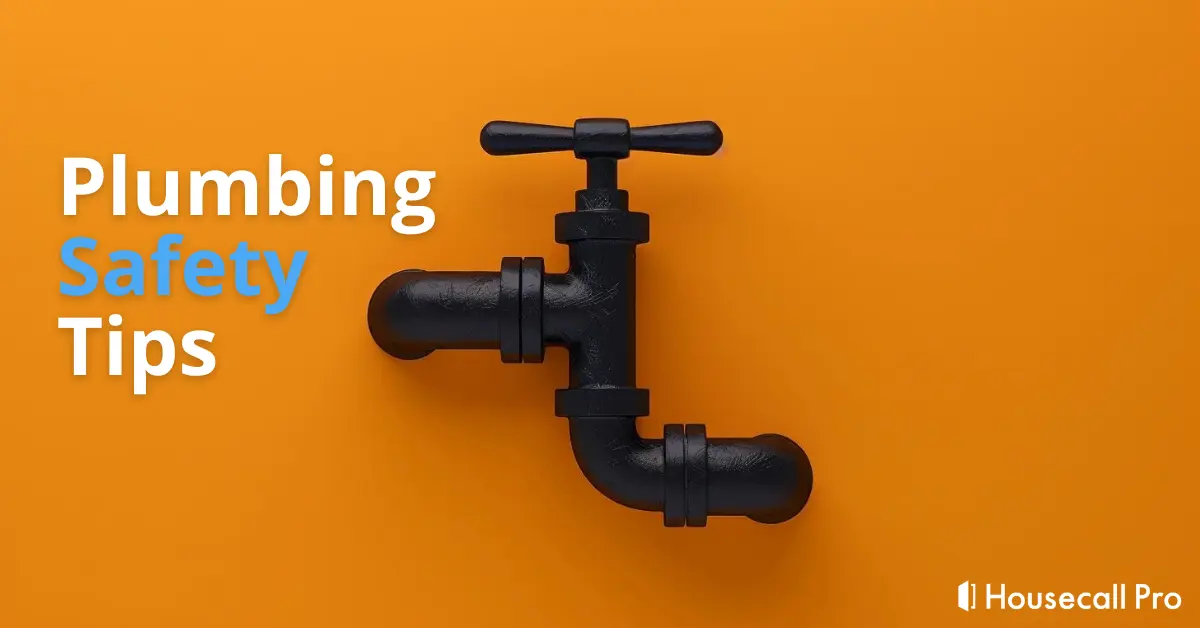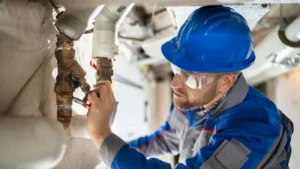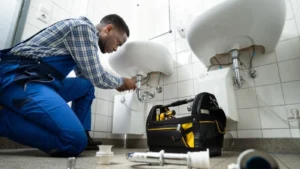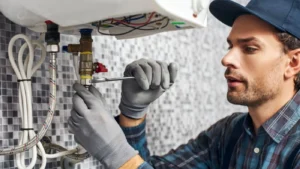Want to win more jobs with less effort?
Grow your business and send quick quotes with our home service software.

Want to see your potential revenue?
See what businesses like yours earn with Housecall Pro in 1 - 2 minutes.

Plumbing is a vital industry that requires precision, skill, and a high-level awareness of safety. The average experienced plumber faces a wide variety of hazards each day – from working with complex piping systems to handling potentially dangerous tools and chemicals. The risk of suffering a major or even life-threatening injury increases when the proper precautions are not taken. Safety on any plumbing job is paramount to create a safe and supportive environment for clients and employees alike.
Whether you are a longtime traditional plumber that stays away from technology or have embraced the digital age with plumbing business software – such as Housecall Pro – there is nothing that can replace the importance of workplace safety. To help plumbers comply with superior safety standards, below is a guide of 15 essential tips to remember while on any job:
- 1. Know As Much About Your Materials As Possible
- 2. Always Use Personal Protective Equipment (PPE) Without Hesitation
- 3. Be Cautious When Working Near Surfaces That Retain Heat
- 4. Handle All Chemicals With Consideration, Caution & Care
- 5. Maintain a Clean & Organized Workspace At All Times
- 6. Follow the Safety Guidelines and Protocol Implemented for Each Tool
- 7. Exercise Caution When Handling and Using Electrical Tools
- 8. Look Around & Be Aware of Your Surroundings Throughout Each Task
- 9. Use Proper Lifting Techniques When Working with Heavy Equipment & Tools
- 10. Remain Hydrated When Working In Hot Or Cramped Conditions
- 11. Take Scheduled Breaks Throughout Your Shift
- 12. Be Prepared for Any Emergency That May Rise
- 13. Stay Up-to-Date on Safety Protocols & Prioritize Continuous Education
- 14. Report And Resolve Any Applicable Safety Hazards
- 15. Use Technology To Your Advantage to Boost Efficiency & Productivity
- Why It's Important for Plumbers to Take Plumbing Safety Seriously
1. Know As Much About Your Materials As Possible
Familiarize yourself with each of the materials and chemicals that you will use before starting any plumbing project. It is highly recommended to conduct thorough research well in advance of your next plumbing job to ensure that you are prepared and fully-equipped to do your best. Take the time to understand each specific property that can assist you with the handling of these materials.
You will also be able to avoid any unnecessary exposure to harmful chemicals and other substances. It is also recommended that you update your MSDS regularly to include any materials or chemicals that should be added to your ever-expanding list. You could also conduct quarterly reviews of the MSDS with the other plumbers on your team to make sure that everyone is knowledgeable and capable. It is highly recommended to develop a quick reference guide that covers basic
2. Always Use Personal Protective Equipment (PPE) Without Hesitation
One of the biggest mistakes that a plumber can make in the field is to assume that their personal protective equipment (PPE) is not necessary at a certain job. This misconception can quickly lead to disastrous results that can affect the livelihood of your employees and the reputation of your company overall. It is essential to always wear applicable PPE needed for each job. From gloves and goggles to masks and ear protection, different tasks may require different equipment. Analyze all the possible scenarios to ensure that your PPE is intact, easily accessible, and ready for use before you head to any worksite.
Plumbers that are focused on safety protocol should also consider investing in ergonomic PPE options that enhance comfort and function without jeopardizing the safety aspect. It would also be helpful to implement a standard PPE feedback loop that allows employees to report on the effectiveness and usability of your equipment.
3. Be Cautious When Working Near Surfaces That Retain Heat
Protective clothing should be an essential factor to consider when working with or near any type of surface that is able to retain heat. This includes any type of soldering equipment, hot pipes or steam systems. Exercise caution when you are near these areas. Remember to use insulating materials and pipe covers to prevent burns as well. Heat-resistant sleeves and gloves will come in handy when working with hot equipment and pipes. It is also great to ensure that all staff members are trained and capable of recognizing & treating burns. Ensure that a burn kit is easily accessible within each service vehicle on your fleet.
4. Handle All Chemicals With Consideration, Caution & Care
Plumbers must handle all chemicals with the 3 C’s: consideration, caution, and care. This consists of reading any applicable labels or instructions – including Safety Data Sheets (SDS). Doing so will keep you educated on the risks involved with each task of every job that you complete. Taking the time to consider this information will help you to exercise appropriate caution when the need arises. It will also help you to show that you care for your safety, the safety of others that may be directly impacted by any negligent or improper handling of these chemicals along with the overall success of your job.
It is also important for plumbers to stay up-to-date perhaps through annual training courses that focus on chemical product changes. You could also focus on any new products or tools that could be added to your inventory that will boost the efficiency of how you handle various chemicals.
5. Maintain a Clean & Organized Workspace At All Times
A cluttered work area is a magnet for trip hazards, slip hazards, and other workplace accidents that can compromise the safety of your plumbers. Your plumbers should make sure that your materials and tools are organized and orderly at the start of each shift. More importantly, they should take the steps necessary throughout the day to keep their materials orderly.
Doing so will allow them to have quick access to the tools and materials that they need throughout each shift without any delay. This will maximize the productivity of each plumber within the average workday. More importantly, though, it will also decrease the chances of an injury or incident caused by an unsafe work environment. You should implement the methodology of 5 S’s – including Sort, Set, Shine, Standardize and Sustain. There is also a series of mobile apps that you can consider using to report and track various cleanup procedures for each site.
6. Follow the Safety Guidelines and Protocol Implemented for Each Tool
Regardless of the tool that a plumber decides to use during a specific job, they must follow the safety protocol and guidelines related to that tool. You should also ensure that each of the tools in your collection are in good working order between jobs. One of the last things you want is to show up to a job that needs a specific tool that you cannot provide either because it is not available in your vehicle or it is not in good working condition.
If you find any that may be defective or malfunctioning, it is highly recommended for you to invest in repairs and replacements accordingly. You could even consider implementing a color-coded tagging system that allows you to identify tools that have already been inspected with ease and efficiency.
7. Exercise Caution When Handling and Using Electrical Tools
Electrical tools are very handy on most jobs – especially when focusing on repair and maintenance. However, when dealing with plumbing tasks, you must remember the danger of working with electricity around water. Make sure that all of your electrical tools are insulated properly before you use them on a job. Electrical tools should never be used in wet conditions at all unless they have been rated accordingly.
Quite a few experienced plumbers may view this as a “gray area” – especially if they have been able to successfully use electrical tools in wet conditions in the past. The vital point to remember is that a life-threatening accident only has to happen once, which is why it is never wise to take such a risk regardless of your experience level with the tool in question. It is highly recommended to schedule regular inspections (preferably monthly or bi-monthly) of the electrical tools. During these inspections, you should focus on the batteries and wiring to ensure that everything is intact and safe.
8. Look Around & Be Aware of Your Surroundings Throughout Each Task
The significance of a plumber’s surroundings cannot be understated. You must remain cognizant of what is taking place around you during each task or job – especially when you are working in an unfamiliar location. Potential hazards can emerge anywhere and at any time. For instance, there may be exposed wires that you overlooked or uneven floors that are not properly marked with signs. In addition, a plumber may need to crawl throughout a tightly confined crawlspace. Being confined within any type of cramped space – such a crawlspace or attic – could easily lead to a life-threatening accident.
9. Use Proper Lifting Techniques When Working with Heavy Equipment & Tools
It is easy to assume that the quicker you are able to lift something, the better. However, an experienced plumber will likely tell you that following proper lifting techniques is of the utmost importance. If you want to last in the plumbing industry without suffering a severe injury that could possibly make you reconsider your career path, then you should focus on implementing proper lifting techniques with each task that calls for them.
For instance, you must keep your back straight and bend your knees. You can then focus on lifting with your legs instead of your back to avoid suffering any type of strain or injury. You should also include a series of warm-up exercises or stretching before you start any task or project that requires heavy lifting. It is also imperative that you prioritize team lifting strategies for awkward or unusually heavy loads to further reduce the risk of injury or another potentially dangerous plumbing incident.
10. Remain Hydrated When Working In Hot Or Cramped Conditions
Hydration is another important part of the workday for any plumber. Unfortunately, this is frequently neglected or not viewed as important as other tools that a plumber may have at their disposal throughout the day. If you are not properly hydrated, then you are putting the quality of your work at risk. More importantly, you are putting yourself at risk – especially if you are working in cramped or hot conditions. Hydrating yourself regularly can help you to keep your focus on the task at hand. It will also improve your physical performance, boost your energy levels, and reduce the overall risk of on-the-job accidents.
In addition to hydration, you should also focus on ensuring adequate airflow within your jobsite. For instance, you could consider using portable ventilation fans, which come in handy within extremely confined areas. Developing a checklist that will help you to assess air quality within confined spaces before starting any type of task or plumbing job.
11. Take Scheduled Breaks Throughout Your Shift
Another effective method that a plumber can use to remain safe on any worksite is to schedule regular breaks throughout their shift. Fatigue can be deadly at any worksite, but especially when you are exposed to dangerous settings and hazardous chemicals. You should take regularly scheduled breaks throughout the day. This is especially the case when you are working through the various stages of a lengthy project. Use the scheduled breaks to rest your mind and body to recharge your energy levels. It is highly recommended to not use these breaks to keep doing more work or even think about the project since that would just deplete your overall energy levels that much faster.
12. Be Prepared for Any Emergency That May Rise
The adage “expect the best, prepare for the worst” should remain impressed within the forefront of a plumber’s mind with every job. It is imperative for a plumber to remain prepared for emergencies. One of the most effective methods to achieve this goal is to know the precise locations of first aid kits throughout the site. It is also important for a plumber to understand basic first aid guidelines and processes. Regardless of where you work, you should familiarize yourself with evacuation plans and emergency exits to ensure that you prioritize safety from start to finish of any project. This includes knowing the precise location of any applicable shut-off valve at the site. You could also regularly update digital files or maps that show the shut-off valve locations for future reference purposes.
You should also offer First Aid and CPR training annually to make sure that all certifications are kept up-to-date within the staff. Thanks to advancements in technology and the digital age, you can also work with virtual reality simulations for training purposes. These VR simulations will help you to introduce the other plumbers on your staff to real-world scenarios that call for emergency response techniques.
Get In Touch: 858-842-5746
Let us earn your trust
See plan options and feature breakdown on our pricing page.
13. Stay Up-to-Date on Safety Protocols & Prioritize Continuous Education
One of the best plumbing safety tips that you can possibly follow is to avoid complacency in this industry. It is easy to assume that you already know everything there is to learn – especially if you have already spent decades working in this field. However, if the only thing that remains the same with time is the fact that everything changes with time. Do your best to stay up-to-date with the latest safety protocols and revised regulations that apply within the industry.
You should also consider exploring and educating yourself on the various advancements that are made each year within the expanding world of plumbing technology. Focusing on continuous education, such as staying up-to-date on plumbing books, can reduce the risk of an outdated principle or practice creating an unexpected hazard within your worksite that may be unsafe. You could also consider collaborating with local trade schools to share updates on safety training programs and corresponding resources.
14. Report And Resolve Any Applicable Safety Hazards
Another helpful adage to consider as a plumbing safety tip is “if you see something, say something.” It is easy to assume that all you need to do when you see a safety hazard is avoid it. However, a safety hazard that you avoid can easily become a life-threatening safety hazard that the customer or one of your coworkers cannot avoid. Report any discovered hazards to the appropriate personnel without delay. It is imperative for you to not try to resolve serious issues on your own unless you are authorized and trained to do so without direct supervision of upper management.
There is also more than enough information that you can get simply by studying industry newsletters and other industry-related reports published throughout the year. Many of these publications focus on updates and revisions made to safety regulations in the plumbing industry, which should make them invaluable resources for plumbers to study and prioritize.
15. Use Technology To Your Advantage to Boost Efficiency & Productivity
Being able to leverage technology and other advanced tools, such as Housecall Pro’s plumbing software solution, can streamline and simplify a variety of aspects for any plumbing business. From invoicing and customer management to dispatching and scheduling, integrating technology will boost the efficiency of your business operations and support the long-term adherence to various safety practices and protocols. Reduce the administrative load that is currently on the shoulder of each plumber on your team by following these tips and allow them to focus on the safety aspects and technical side of their work instead.
Why It’s Important for Plumbers to Take Plumbing Safety Seriously
Skilled professionals are always in demand within the plumbing industry. The services provided by these tradespeople are essential to the overall improvement and maintenance of residential, industrial, and commercial infrastructure. It is imperative that plumbers follow stringent safety measures to keep themselves and others protected while on the job, especially with the integral role that plumbers play in the safety and health of a community.
Enhancing the overall reputation and efficiency of the plumbing profession is just one of the benefits of adhering to appropriate safety precautions. In addition, plumbers are also able to skillfully and strategically minimize the risks associated with jobsite injuries and accidents. Working the safety tips outlined above into the daily routine is vital for every plumber to consider – especially if they want to maintain a productive and successful career within this indispensable trade.






